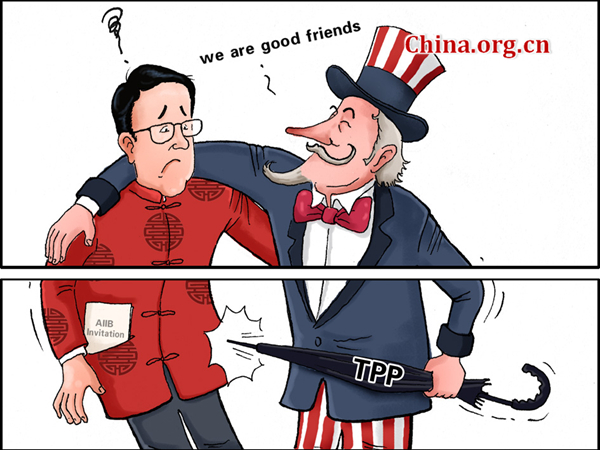China's Central Economic Work Conference, Pax Sinica and the global order
- By Sumantra Maitra
 0 Comment(s)
0 Comment(s) Print
Print E-mail China.org.cn, January 2, 2016
E-mail China.org.cn, January 2, 2016
|
|
|
Another gamesmanship[By Zhai Haijun/China.org.cn] |
A curious little essay appeared in the New York Times. It was entitled "Cracks in the Liberal Order" by Ross Douthat, and it talked about how the post-Cold war order had been shaken during 2015, and how Pax Americana was a dying concept.
According to Douthat, the liberal order had survived some brutal attacks and various setbacks in the last quarter of a century, including, most importantly, the rise of China, the "dot com bust," the 9/11 terrorist incident and the rise of Islamism as an ideology drawing mindless and disillusioned youth from the West, while, funnily enough, their Middle East counterparts are flocking West in search of a liberal life free from societal constraints they'd been experiencing.
Douthat argues that no ideology had been able to shake the foundations of the world order until now. So, what is the reason?
The writer believes it is the rise of Populist parties, both economical tra-left and ultra-right, in Europe, and the rise of nativist economically jingoistic ultra-nationalism in West, combined with the Islamic jihad, and the rise of "Putinism."
Ironically, Ross chose to write this article in the same week China's Central Economic Work Conference was held in Beijing, which he totally failed to mention. From a statement, it appears China will focus on five tasks in 2016: cutting industrial capacity, reducing the housing stock, cutting official debt, lowering corporate costs and improving various weak system links.
A CNTV analysis mentioned the government will focus on the biggest poverty reduction endeavor, improve technological advancement and foster emerging sectors. It also stated that to stimulate growth, an overhaul will be undertaken to prevent the supply glut, and resolve industrial overcapacity.
Like supply side reforms across the world in the 1980s, Chinese administrators vowed to cut down and streamline factors causing sluggish growth, which will please foreign investors.
The Douthat analysis, meanwhile, also ignores the start of the AIIB and that the RMB was recognized as a global currency. The China-backed Asian Infrastructure Investment Bank was formally established and is expected to be operational early in 2016 as the bank's 17 founding members ratified an agreement. The bank is about to hold its opening ceremony in January and elect its president.







Go to Forum >>0 Comment(s)